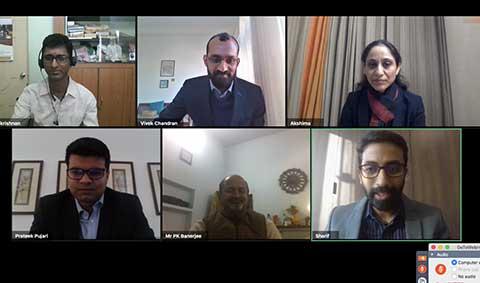Focus on electrification of 3-wheeler more as compared to 4W; Need state and city-level action plans for electrification of urban freight: TERI
Mr Sudhendu J Sinha, Adviser, Transport, NITI Aayog, said, "As India’s urban population continues to grow, we have to address the transport sector and its implications.

Focus on electrification of 3-wheeler more as compared to 4W; Need state and city-level action plans for electrification of urban freight: TERI
New Delhi, December 18, 2020: The Energy and Resources Institute (TERI), with the support of Shakti Sustainable Energy Foundation (SSEF), released a report today on the Roadmap for Electrification of Urban Freight in India. Speaking at the virtual launch of the report, Mr Sudhendu J Sinha, Adviser, Transport, NITI Aayog, said, "As India’s urban population continues to grow, we have to address the transport sector and its implications. The urban freight sector is no more confined to four and three-wheelers; it also comprises two-wheelers with the advent of e-commerce. One of the most significant challenges in the three-wheeler segment is with respect to finances. However, that cost is now coming down to 25-30 per cent in India."
Citing the success of Public-Private Partnership (PPP) model for the adoption of EVs in Kochi, he added, "Awareness campaigns should be taken up to promote the uptake of these electric 3W vehicles", Mr Sinha added.
The study was conducted by TERI with an objective to assess the operational and financial feasibility of EVs in the urban freight (UF) segment by undertaking a survey-based analysis of five sectors across three cities namely Delhi, Bengaluru and Surat.
Key researcher and author of the report, Mr Sharif Qamar, Associate Fellow & Area Convenor, Centre for Sustainable Mobility, TERI, said, "Our key findings suggest that the total cost of operation is rapidly turning in favour of EV variants, and diesel prices, range of EVs and subsidies play a significant role in overall total cost of ownership (TCO) of EVs. He also mentioned that a large proportion of LCVs currently plying in Indian cities are pre-BS-IV emission standards, and focus is needed to upgrade these to newer vehicles.
"EVs are increasingly being introduced in the urban freight/last-mile delivery services in India cities. Up to 14% reduction in CO2 emissions is attainable in the small commercial vehicle segment with higher EV penetration in total sales by 2030", Mr Qamar added.
The key recommendations of the study are as follows:
- Countrywide national programme for electrification of urban freight sector
- Electric freight procurement schemes for government sectors
- Integration with other government programmes
- Nationwide scrapping policy programme, with a focus on EV replacement (incentives for retrofitted vehicles as well)
- State and City-level action plans for electrification of urban freight segments
- Financial credibility framework for the manufacturers and drivers
- Favorable terms of finance for electric freight vehicle by the lending institutions
- Risk sharing mechanisms – Government, large banks and small financial institutions
- More EV variants/options for the customers (3W & 4W)
- Encourage private–public partnership by city/government agencies for plying electric urban freight vehicles
- Demarcation of EV zones, and registration, time-of-day operation and parking preferences for EVs
- EV feasibility studies required in the city-specific freight sector
- Increased awareness programmes focusing the commercial segment (include UF segment in the national/state awareness programmes)
Mr Ruchir Shukla, Director, Electric Mobility Program, SSEF, said "Commercial vehicle in India is turning into one of the biggest segments with more relevance to urban transport. The trends/ownership of smaller commercial vehicles in the last 10 years has nearly doubled. This gives opportunities to bring and introduce new and relevant policies to implement and support SCVs as well as increase EV fleet."
Mr Shri Prakash, Distinguished Fellow at TERI, said "Congestions and traffic restrictions in cities mean that SCVs have more penetration in urban spaces. City/local governments should be increasingly involved in the implementation of EV policies, as they are more concerned with city-level policy imperatives/challenges. Empowering them is a good step towards resolving urban freight and transport-related barriers."
He added that, apart from the electrification, natural gas would also be important for clean mobility. "The next decade will be very important for sustainable transport as we have to take all the possible alternatives in order to solve the issues pertaining to sustainable mobility", he said.
During a panel discussion on decarbonising the urban freight, Mr PK Banerjee, Executive Director, SIAM said, "Local pollution is the best consideration for pushing electrification of freight segment. Electric freight has a big mark to make in electrification goals of India."
About TERI
The Energy and Resources Institute (TERI) is an independent, multi-dimensional organisation, with capabilities in research, policy, consultancy and implementation. It has pioneered conversations and action in the energy, environment, climate change, and sustainability space for over four decades.
The institute's research and research-based solutions have had a transformative impact on industry and communities. Headquartered in New Delhi, it has regional centres and campuses in Gurugram, Bengaluru, Guwahati, Mumbai, Panaji, and Nainital, supported by a multi-disciplinary team of scientists, sociologists, economists and engineers, and state-of-the-art infrastructure.
Read Also : Vice Admiral Dinesh Kumar Tripathi appointed as next Chief of the Naval StaffNews Must Read
- CIL’s capex up 6.5% to highest Rs.19,840 Crores in FY 2024
- SCOPE presents SCOPE PREMIER LEAGUE
- MCL Ib Valley Washery commenced commercial operation
- HAL bags Rs 65,000 Cr tender by Defence Ministry
- PSBs' growth output superseded Private Lending firms
- Northern Coalfields Limited CMD inspects Amlohri Area
- SCOPE organizes Public Sector Day celebrations
- IOCL Final Dividend Announcement Expected at April 30 Board Meeting
- Steel Cutting Ceremony of Indian Navy held at HSL Vishakapatnam
- DIPAM declines PFC-REC debt resolution proposal for KSK Mahanadi project